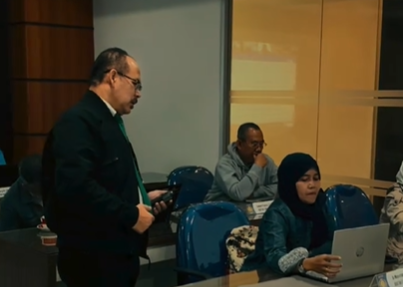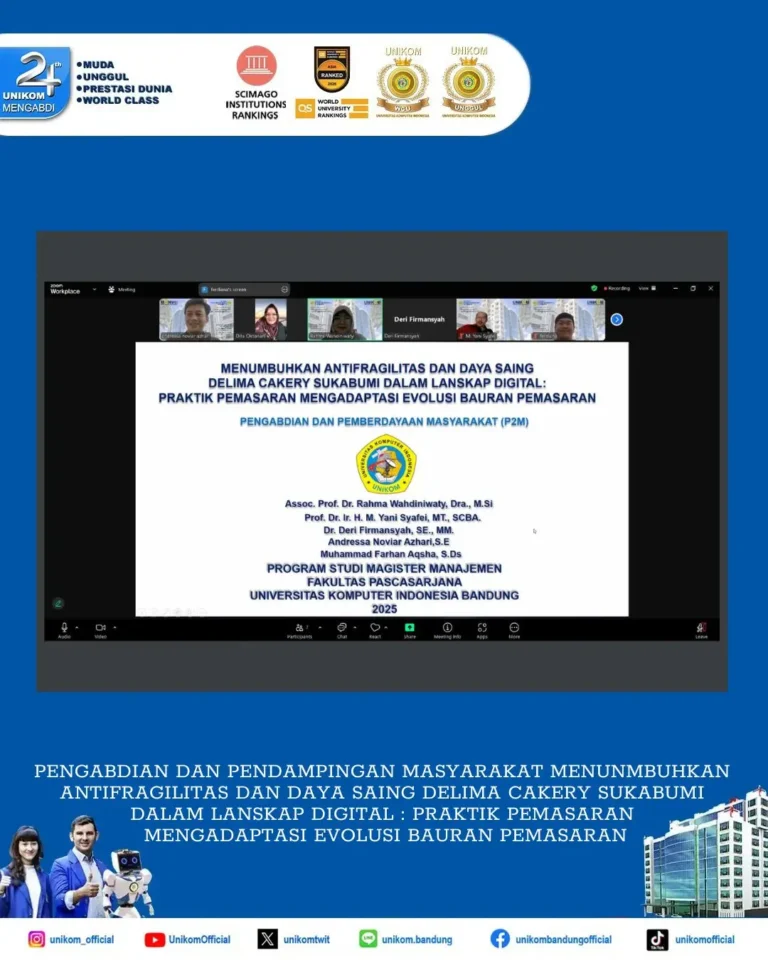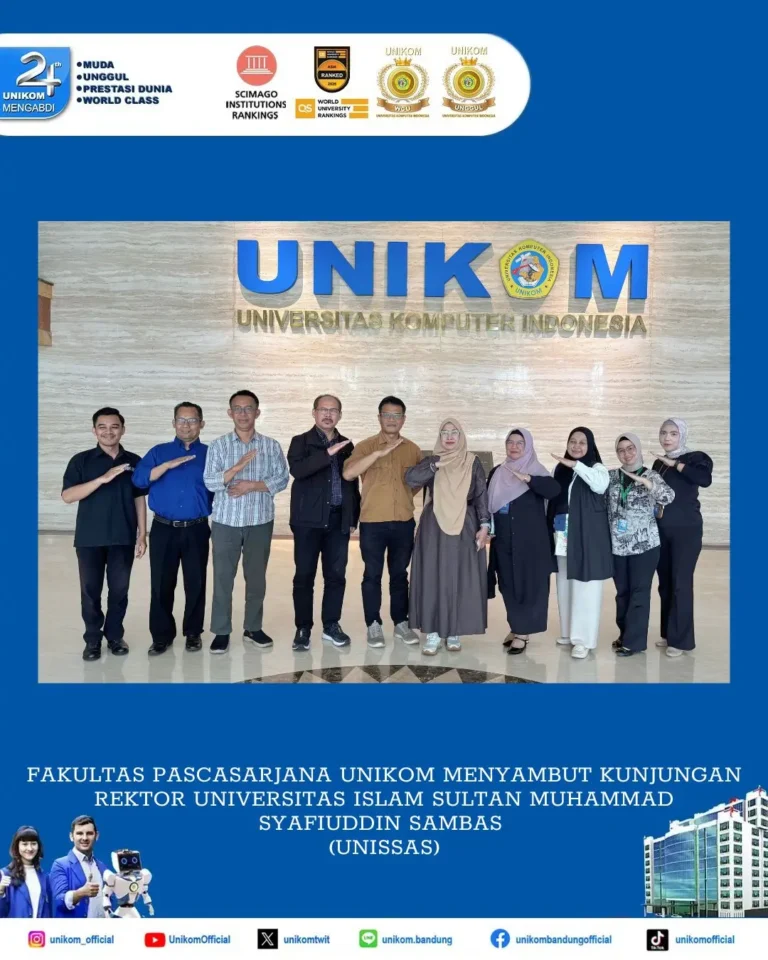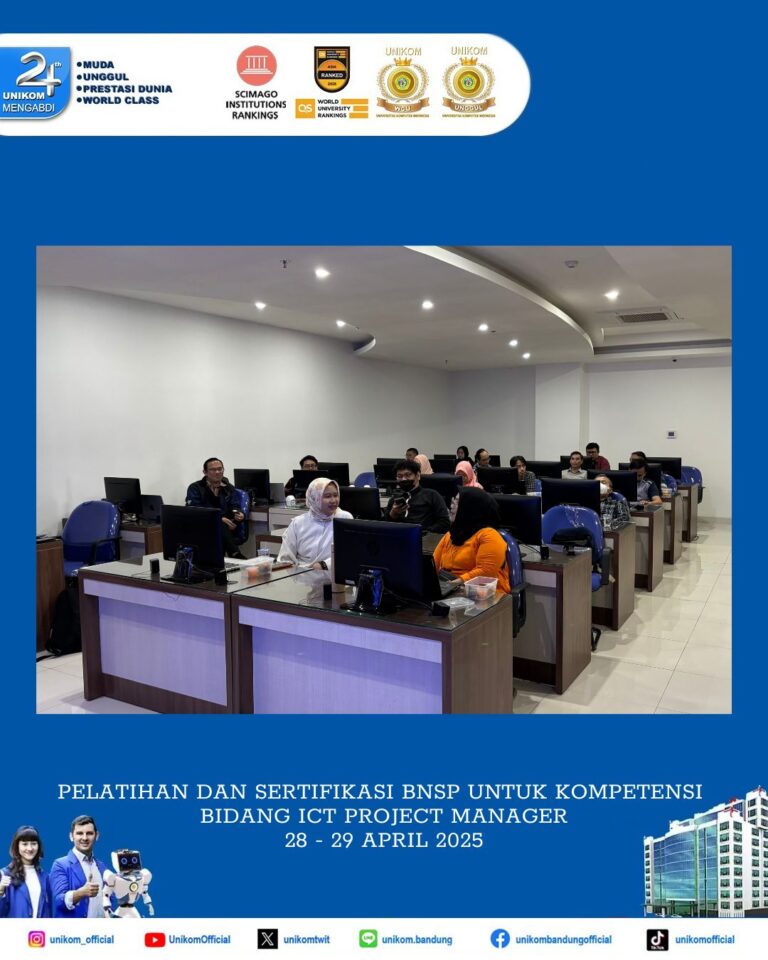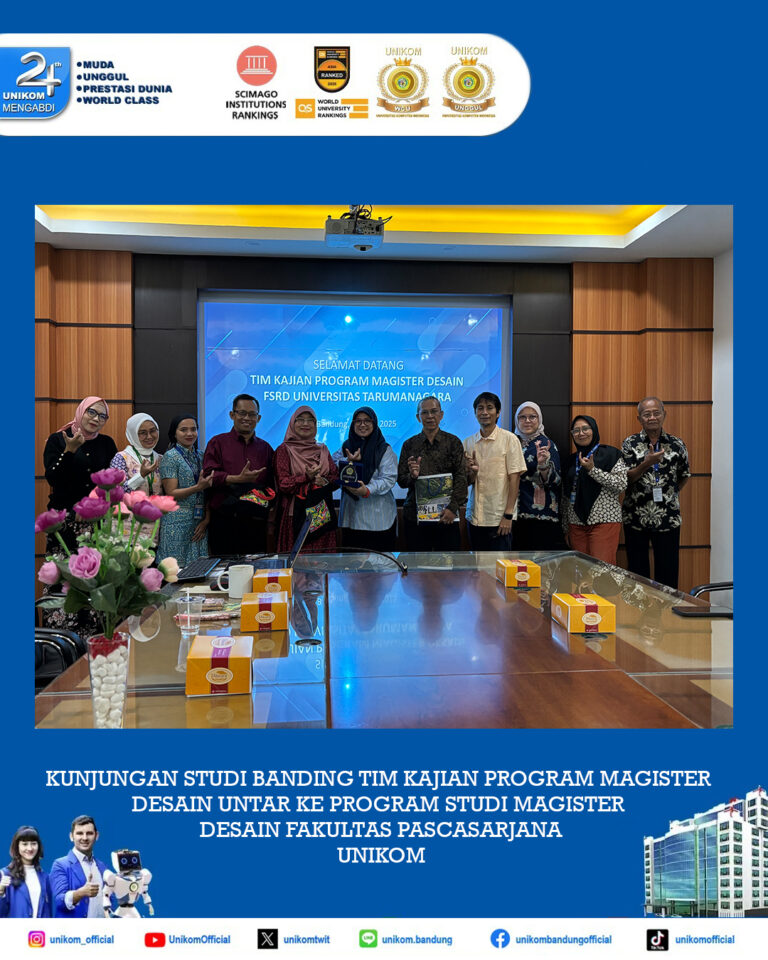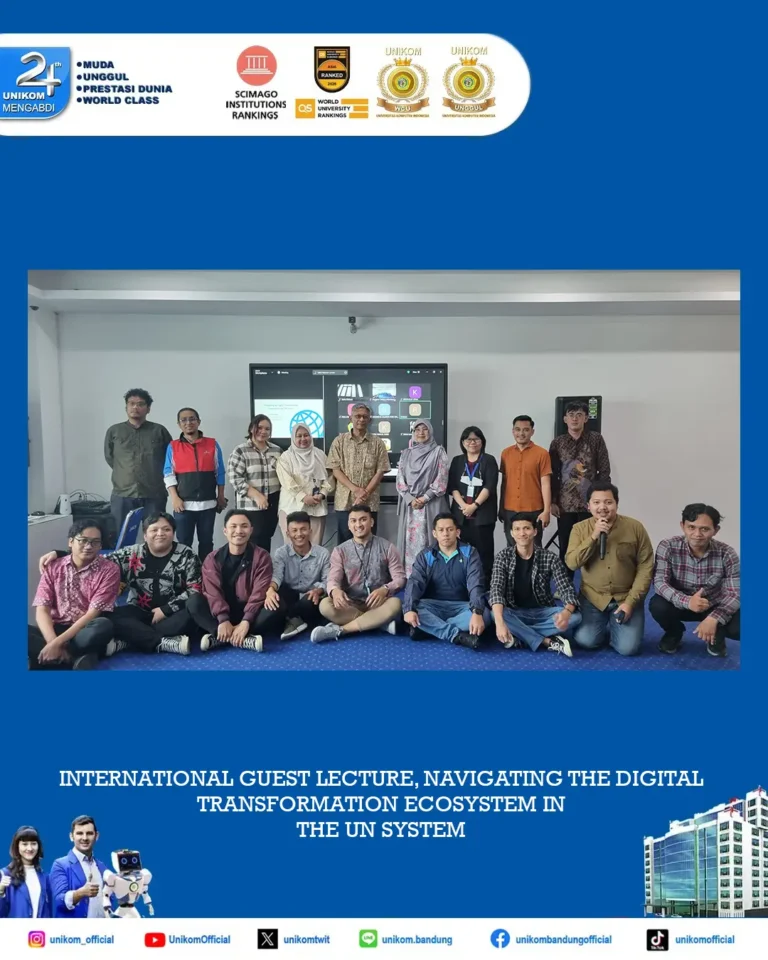


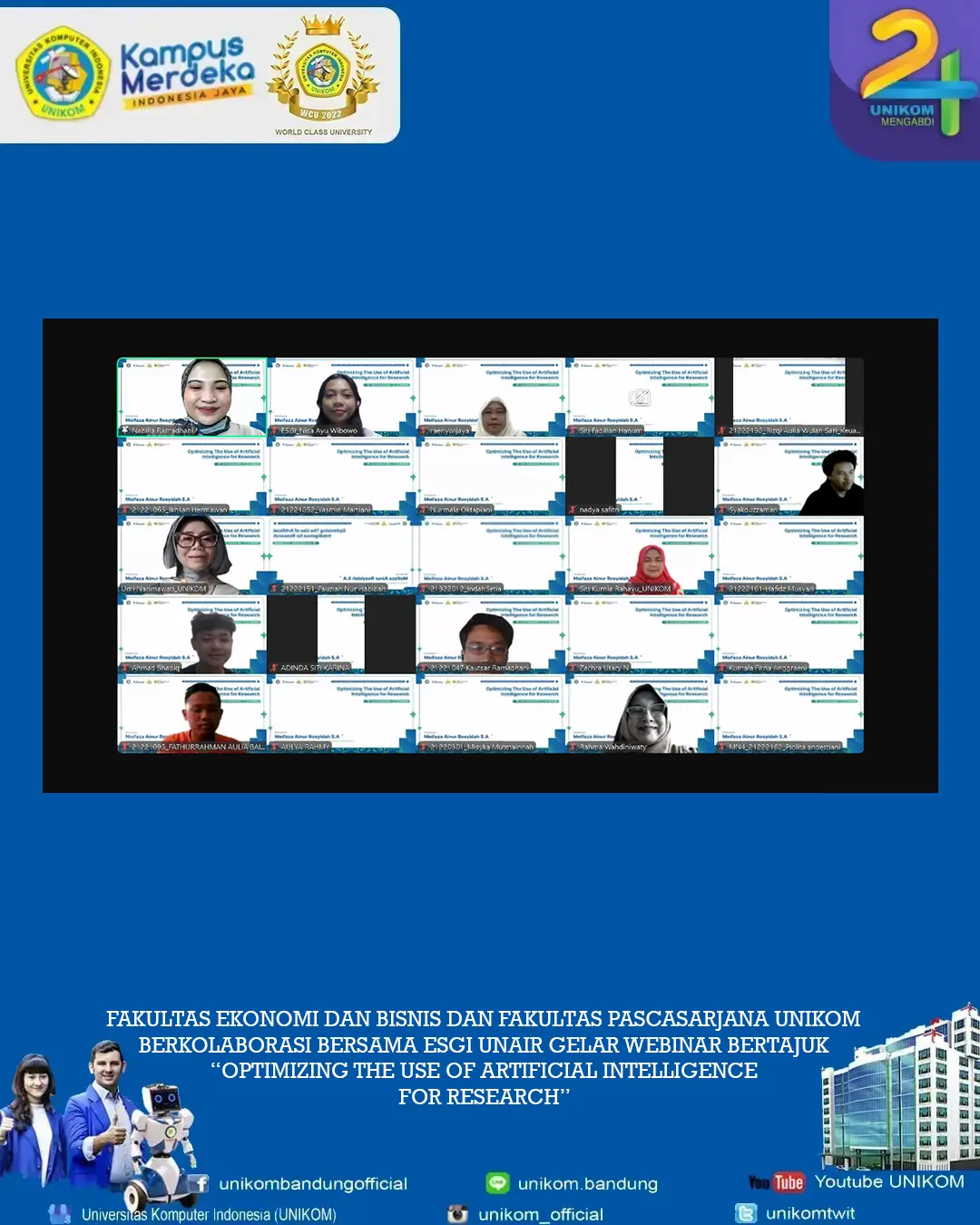


Tentu, berikut terjemahan teks ke dalam bahasa Inggris:
BANDUNG, UNIKOM – The Faculty of Economics and Business (FEB) and the Postgraduate Faculty of Universitas Komputer Indonesia (UNIKOM), in collaboration with ESGI – Universitas Airlangga (UNAIR), organized an online webinar titled “Optimizing the Use of Artificial Intelligence for Research: Enhancing Research Quality with AI.” The event took place on Friday, February 28, 2025, from 09.00 – 11.00 AM WIB via the Zoom platform, and was attended by students and lecturers from various study programs within FEB and the UNIKOM Postgraduate Faculty.
The webinar was opened by the Vice-Rector I for Academic Affairs at UNIKOM, Prof. Dr. Umi Narimawati, Dra., S.E., M.Si., M.Pd., who emphasized that the utilization of Artificial Intelligence (AI) can increase the efficiency and quality of academic research. “AI is not just a tool but a solution to accelerate analysis, enhance accuracy in research, and enrich academic insight. However, its use must prioritize ethics and scientific integrity,” said Prof. Umi.
As the keynote speaker, Meifaza Ainur Rosyidah, S.A., Research Assistant at CESGS-UNAIR, presented on the strategic role of AI in academic research. She highlighted how AI can accelerate data analysis, improve the precision of literature, and assist in data-driven decision-making. Key points from her presentation included:
Utilization of AI in Accounting and Management Research – AI can be used in:
(i) Data Analysis Automation: AI supports big data processing, financial trend analysis, and automated auditing.
(ii) Business and Market Prediction: AI assists researchers in financial forecasting and decision-making based on industry trends.
(iii) Intelligent Literature Review: AI speeds up the screening of academic references, facilitating the search for relevant journals.
AI Tools Supporting Research Writing and Analysis – Introduction to various AI-based tools:
(i) ChatGPT, Grammarly: Assists in academic text composition and grammatical correction.
(ii) Zotero, Mendeley: Automatically manages scientific references and citations.
(iii) NVivo, Atlas.ti: Systematically analyzes qualitative data.
(iv) Scite.ai, Elicit: Increases the efficiency of searching for credible academic sources.
Ethics and Limitations in AI Use – Highlighting issues of plagiarism, data reliability, and technological limitations in the academic world, ensuring that research maintains high scientific value. AI must not replace the critical thinking of researchers. AI relies on open sources, necessitating verification of credibility. Academic institutions need to establish clear guidelines regarding the use of AI in research.
The webinar served as an important platform for students and lecturers to understand how AI can enhance research effectiveness. The interactive discussion during the Q&A session revolved around how to optimize AI in research methodology, processing quantitative and qualitative data, and its use in writing scientific articles. This webinar is also part of the faculty’s strategy to improve the quality of student and lecturer research across all study programs, by encouraging the responsible use of AI in academic research.
Heads of Study Programs within FEB who attended the event included:
- Assoc. Prof. Dr. Raeni Dwi Santy, S.E., M.Si., CIMA – Head of the Undergraduate Management Study Program
- Dr. Rizki Zulfikar, S.E., M.Si – Head of the D3 Marketing Management and D3 Finance & Banking Study Programs
- Assoc. Prof. Dr. Sri Dewi Anggadini, S.E., M.Si., Ak., CA – Head of the Undergraduate Accounting Study Program
- Assoc. Prof. Dr. Wati Aris Astuti, S.E., M.Si., Ak., CA – Head of the D3 Accounting Study Program
As a follow-up to this seminar, FEB and the UNIKOM Postgraduate Faculty will develop specialized training programs and workshops for lecturers and students to deepen their understanding of AI use in research. The Dean of FEB, Prof. Siti Kurnia Rahayu, affirmed that the adoption of AI technology in research must be balanced with the strengthening of academic competence and scientific ethics. “We will continue to strive to strengthen the insights of lecturers and students in utilizing AI to support more innovative, relevant, and high-quality research. AI is not meant to replace the role of academics, but as a tool to accelerate and improve the quality of research,” stated Prof. Siti Kurnia Rahayu.
With the increasing development of artificial intelligence technology, it is hoped that FEB and the UNIKOM Postgraduate Faculty can become pioneers in the utilization of AI for academic research in Indonesia. The FEB and Postgraduate Faculty are committed to continuously supporting innovation in research, by leveraging cutting-edge technology to create research that has a broad impact on the development of science and industry. (Directorate of Public Relations & Promotion), utilizing cutting-edge technology to create research that has a broad impact on the development of science and industry. (Direktorat Hms & Pro)

